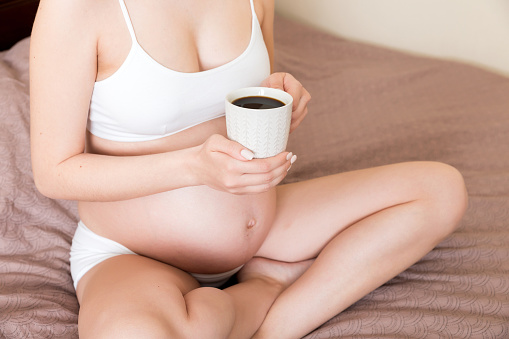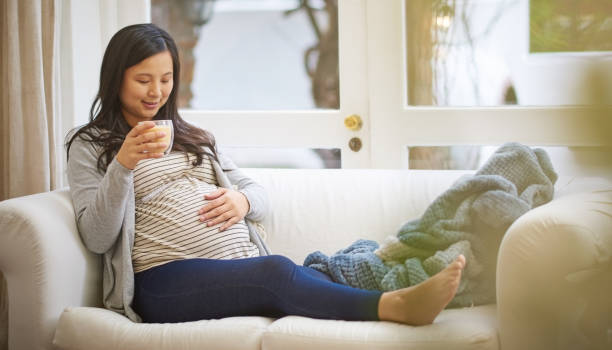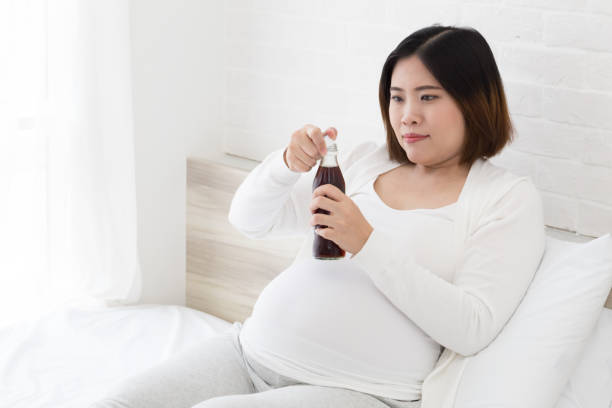Caffeine is a stimulant used in tea, coffee, soft drinks, cocoa, kola nuts, energy drinks and certain over-the-counter drugs. Coffee is one of the most important causes of high caffeine consumption. During pregnancy, caffeine removal from the mother’s blood speeds down considerably. Results from several retrospective research show that high consumption of caffeine could be linked with growth limitation, decreased birth weight, preterm birth or stillbirth. How much caffeine is safe during pregnancy? For pregnant women with high daily caffeine consumption (more than 300 mg a day), reducing daily caffeine intake during pregnancy is advised. In fact to minimize the risk of infant failure and low birth weight neonates it could be avoided entirely.

Common Sources of Caffeine
Caffeine is normally present in the following foods / drinks:
- Coffee
- Tea
- Chocolate
Caffeine is added into:
- Cold and flu remedies
- Energy drinks
- Soft drinks, such as cola
HOW MUCH CAFFEINE IS SAFE WHILE PREGNANT?
You should not have to totally give up coffee when pregnant. Although it is clear that pregnant women were formerly urged to abstain from coffee and other sources of caffeine altogether, recent research indicates that small doses are healthy with a few precautions.
According to current recommendations from the American College of Obstetricians and Gynecologists (ACOG) and other authorities, pregnant women should safely drink up to 200 milligrams of caffeine a day (the equivalent of one 12-ounce cup of coffee).
Beyond that, there is some research that could slightly raise the likelihood of miscarriage, but the evidence is inconclusive. However, since caffeine will pass via the placental membrane, the majority of physicians prescribe strictly adhering to the 200-milligram level.
What if you’re not a coffee drinker yet like a cup of tea in the morning? Caffeine content varies by product, although the following are several basic guidelines:
- 8 oz. brewed drip coffee contains 137 mg
- 8 oz. brewed drip coffee contains 137 mg
- 8 ounces of a caffeinated beverage: 100 mg
Caffeine can also be used in chocolate and soda. And, though it is not mandatory to abstain completely from caffeine while pregnant, you can be cautious on how much you consume and lean on the side of caution.
HOW DOES CAFFEINE AFFECT YOU AND YOUR BABY WHEN YOU’RE PREGNANT?
Caffeine marginally raises your blood pressure, pulse rate, and the volume of urine generated by your body. Caffeine will make you jittery, induce indigestion, and make it difficult to sleep. Caffeine can be particularly irritating during pregnancy because it takes the body longer to eliminate it than it would if you weren’t pregnant. It can even cause you feel dizzy or nauseous.
Caffeine flows through the placenta to your kid as you consume it during birth. The placenta develops in your uterus (womb) which provides food and oxygen to the baby by the umbilical cord.
You might have learned that drinking so much caffeine may result in miscarriage (when a baby dies in the womb by 20 weeks of pregnancy), preterm birth (birth before 37 weeks of pregnancy), or low birth weight (when your baby is born weighing less than 5 pounds, 8 ounces). Any reports support this, although others do not.
Before we learn all on how caffeine affects pregnancy, it’s safe to restrict the intake to 200 milligrams a day. This is roughly equivalent to 112 8-ounce cups of coffee or one 12-ounce cup of coffee. Check the scale of your cup to see how much caffeine you’re having.
IS THERE ANY ADVANTAGE OF DRINKING CAFFEINE WHILE PREGNANT?
Caffeine has been found to increase stamina and alertness in moderate amounts, and it can even wake you up during a night of tossing and turning. However, there is no proof that caffeine has any specific effects during pregnancy.
It’s good to get a little caffeine if necessary, as long as you keep track about how much you’re taking in. But if you didn’t drink coffee before, there’s no need to start now that you’re pregnant.
WHAT IS THE CAFFEINE CONTENT OF TEA VERSUS COFFEE?
Tea usually contains less caffeine than freshly brewed coffee The map below will help you determine the caffeine content of various drinks:
Coffee
- 95 to 165 mg per 8 ounces of brewed coffee
- 2 to 5 mg in 8 ounces of filtered decaf coffee
- 1 ounce espresso contains 47 to 64 mg of caffeine.
- 0 mg in 1 ounce decaf espresso
- 63 mg in 8 ounces of instant coffee
- 2 mg per 8 ounces instant decaf coffee
- 63 to 126 mg per 8-ounce latte or mocha
For tea:
- 25 to 48 mg in 8 ounces of brewed black tea
- 2 to 5 mg in 8 ounces of brewed decaf black tea
- 25 to 29 mg in 8 ounces of brewed green tea
Soda & energy drinks
- 27 to 164 mg in 8 ounces of energy drink
- 8 oz. cola: 24 to 46 mg
- 40 to 100 mg per ounce of energy shot
Since caffeinated tea contains less caffeine than coffee, if you like the routine of doing your everyday caffeine run and keeping a hot mug in your hands, switching from coffee to tea can be beneficial.
While one 8-ounce cup of coffee contains near to 200 mg, an 8-ounce cup of black tea contains just 50 mg, allowing you to consume two without exceeding the prescribed volume.
CAFFEINE-REDUCTION TIPS FOR PREGNANT WOMEN
Since it’s often prudent to lean on the side of safety while pregnant, suggest limiting caffeine consumption to one or two (small) cups a day at most. If even that seems overwhelming, here are some tips for simplifying the process:
Determine what you like most from your caffeine fix.
Is it the aroma of coffee that you yearn for? That’s easy — just turn to a high-quality decaf brew and appreciate the taste without caffeine (even espresso comes decaf). Are you unable to sparkle without carbonated beverages? Instead, go for sparkling wine, sparkling fruits, or sparkling caffeine-free sodas, though only in moderation whether they are sweetened with sugar or chemical sweeteners. Are you dependent on caffeine’s energizing effect? Gain a healthier energy boost by snacking on complex carbs and proteins (both of which are included in cheese and crackers or dried fruit and nuts), walking daily (even a 10-minute stroll can jump-start the energy level), and having enough sleep (but not too much, which can actually make you more tired)
Find out where the caffeine is hiding.
There are some food you are consuming that may contain caffeine! Your responsibilty is to find them out. This is because even after knowing how much caffeine is safe during pregnancy,you will not be able to measure or control what you are ingesting if you dont know where the caffeine is hiding! Do you realize that caffeine is used in a variety of sodas, energy drinks, chocolate and coffee-flavored yogurt and ice cream? When calculating the caffeine intake for the day, be sure to include all these hidden caffeine sources.
Dont rush to reduce your caffeine intake.Proceed cautiously.
Eliminating six cups of coffee in a single day can shake the brain — which can leave you tired, irritable, and headache-prone (the last thing you need on top of pregnancy fatigue). Therefore, abandon the cold turkey preparations in favor of a phased solution. Reduce one cup a day before you reach the two-small-cups-per-day threshold (or continue if you choose to remain fully caffeine-free). If even that sounds excessively rapid, maintain the same number of cups but substitute decaf for half of each (you should hold the other half normal), gradually weaning yourself off the taste and kick of the real thing by decreasing the amount of regular and increasing the amount of decaf. Before you know it, the cups would be far less caffeinated and below the recommended caffeine levels for pregnancy. Making your own latte is another way to reduce your consumption. Reduce the coffee to half a cup and top it off with hot milk.
Find energy in the traditional manner.
Consuming smaller, more regular meals and snacks, which is a healthy thing in general when pregnant — but particularly when decaffeinating — can help maintain your energy levels high by preventing your blood sugar from dropping. Prenatal supplements can also assist you in maintaining your stamina when abstaining from caffeine. Now take the additional four dollars or so you spend on coffee per day (plus the cost of the corresponding donut) and place it in an empty coffee cup. Treat yourself at the end of the week (manicure, anyone?) You deserve it!
Although the prospect of reducing even another staple of your diet might be discouraging, keep in mind that it may not be permanent. Soon enough, you’ll be able to resume drinking a few cups of your beloved coffee on a daily basis without fear. And you’re going to need it until the baby is born!
- RELATED : Alcohol and Pregnancy
CAFFEINE: MYTHS OR FACTS?
Caffeine is used in a variety of foods, not just coffee. Caffeine is used not only in coffee, but also in tea, soda, cookies, and certain over-the-counter headache drugs. Consume with caution.
#Caffeine is known to induce birth defects in humans.
Fact: Numerous animal studies have shown that caffeine may result in birth defects, preterm labor, decreased fertility, and an increased likelihood of low-birth-weight offspring and other reproductive problems.
While no definitive human trials have been conducted, it is always prudent to err on the side of caution when it comes to inconclusive studies.
While no definitive human trials have been conducted, it is always prudent to err on the side of caution when it comes to inconclusive studies.
Caffeine is known to induce infertility & miscarriages.
Fact: According to one report published in the American Journal of Obstetrics and Gynecology, people who drink 200mg or more of caffeine regularly are twice as likely to miscarry as those who do not.
Another research published in Epidemiology found little evidence of an elevated risk of women who consumed just a small amount of coffee everyday ( between 200-350mg per day.)
Due to contradictory findings from various trials, the March of Dimes recommends that pregnant women restrict their caffeine consumption to fewer than 200 mg a day before further definitive research is conducted. This is approximately equivalent to one 12 oz cup of coffee.
A pregnant woman should not consume ANY caffeine
Fact: According to experts, small amounts of caffeine have been shown to have little adverse impact on pregnancy. The term “moderate” refers to doses ranging between 150 and 300 mg a day. The American Pregnancy Association recommends abstaining from caffeine as frequently as practicable during pregnancy


